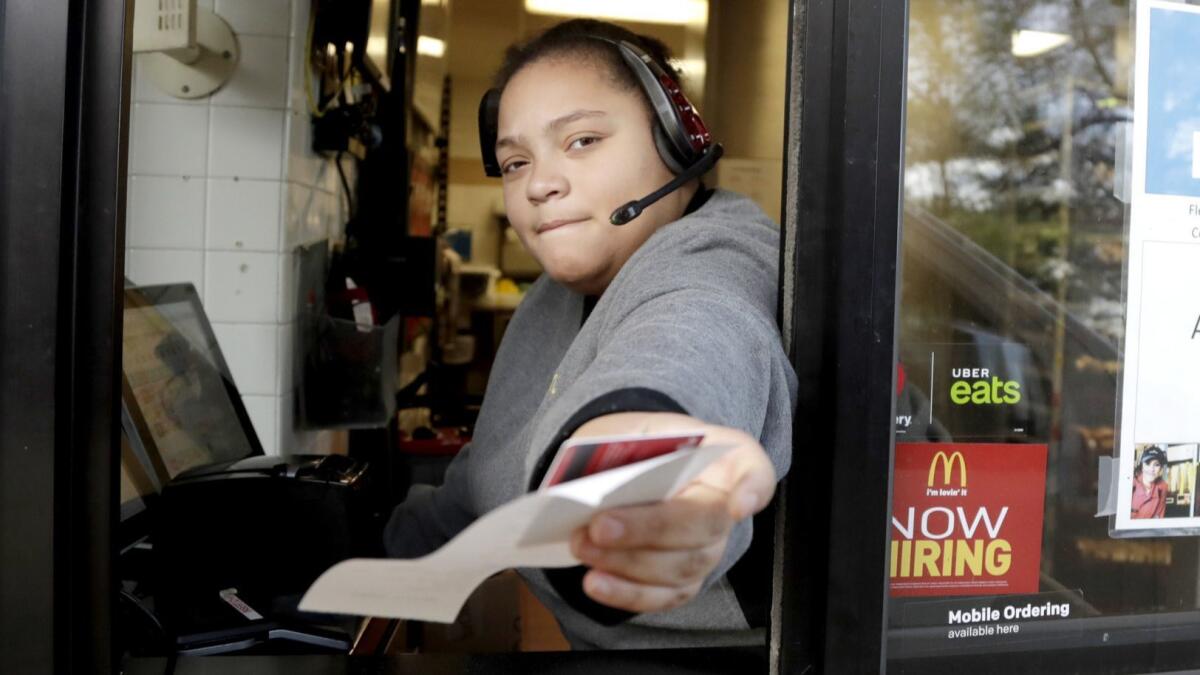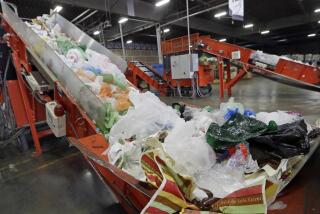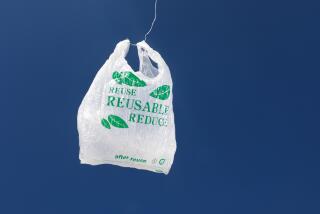Editorial: Paper receipts aren’t just wasteful, they may be bad for your health

- Share via
Many financial institutions, insurance companies, utilities, internet service providers and other businesses that provide services to consumers have wholeheartedly embraced paperless billing. For obvious reasons: Sending bills by e-mail and collecting payments digitally saves time and money.
It makes life easier for consumers as well to settle their accounts without having to dig out their checkbooks, hunt around for stamps and then wander out to the mailbox. To sweeten the deal, paperless transactions are an environmental benefit because they save uncountable tons of water, trees and power that would have gone into producing paper, which has a relatively short useful life.
Businesses that sell things, however, have been slower to adopt paperless technology. Some stores and restaurants now offer email or text receipts to customers, but most still rely on old-fashioned paper proofs of purchase — some of them comically long. CVS drugstore, for example, is so notorious for super-long receipts filled with coupons and promotional come-ons that it has become a social media joke. Cashiers often foist these pieces of paper on customers whether they want them or not.
These chemicals act like hormones and there is growing concern that they may be causing cancer, infertility and birth defects, among other things.
But there is a good reason to offer customers a non-paper alternative beyond the fact that they produce quite a bit of trash: Paper receipts may be treated with hazardous chemicals.
It seems unbelievable, but it’s true. Sales receipts handed out by most retailers are usually printed on thermal paper using heat rather than ink. This process results in shiny slips of paper that are coated with bisphenol A or bisphenol S, endocrine-disrupting industrial chemicals that can be absorbed through the skin and into the bloodstream. These chemicals act like hormones and there is growing concern that they may be causing cancer, infertility and birth defects, among other things. The Food and Drug Administration banned bisphenol A, or BPA, from being used in baby bottles and sippy cups in 2012, and California has added it to the Proposition 65 list of hazardous chemicals that require consumer warnings. Because of BPA’s negative press, it has been replaced in many uses with bisphenol S, a chemical cousin. But it may be no safer; studies show it acts the same way in the body.
BPA and BPS lurk in products all around us, notably in plastics, and research has shown that most people have trace amounts in their bodies. But that the millions of paper receipts consumers handle every day might be another — and significant — source of exposure is not well known.
It was news even to California Assemblyman Phil Ting (D-San Francisco), who is now pushing legislation that would require large retailers, banks and other business to offer paper receipts only upon customer request by 2022. Originally, Ting was targeting receipts as a way to cut off a significant source of waste in the face of a faltering recycling market. But when he learned about the presence of these chemicals — which environmental groups had been warning about for some years — that became a big selling point of the bill: Not only is thermal paper difficult to recycle, it is a ubiquitous source of a worrisome chemical that makes it a potential danger to humans.
Enter the Fray: First takes on the news of the minute »
The trade associations for retailers, grocery stores and banks are all opposed unless their members can be exempted from the law. They argue that paper receipts are still necessary for patrons to prove they bought something and to return purchases, at least until the technology advances. In rural locations with spotty wireless service, there’s no assurance that emailed receipts will transmit quickly enough to be useful to patrons. The companies also express concern about the cost involved in having to buy new point-of-sale readers capable of sending emailed receipts, especially as they adjust to paying higher minimum wages. And they worry their customers might be concerned about privacy intrusions as the companies begin to collect emails and other contact data.
While many business are moving toward adopting e-receipt technology, this bill would force them to do it faster than may be practical or affordable for some.
These are legitimate concerns, and it’s important that lawmakers don’t ignore them as they move forward. But surely these issues can be worked out. For one thing, the world is heading toward a paperless future. For another, it is obviously not good business practice to expose customers (or retail employees, who unsurprisingly have been found to have higher levels of these substances in their bodies) to potentially harmful chemicals when there are other options.
Follow the Opinion section on Twitter @latimesopinion and Facebook
More to Read
A cure for the common opinion
Get thought-provoking perspectives with our weekly newsletter.
You may occasionally receive promotional content from the Los Angeles Times.






